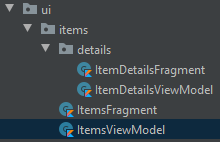Can you tell me if my approach is right? It works but I don't know if it's correct architecture. I read somewhere that we should avoid calling viewmodel function on function responsible for creating fragments/activities mainly because of screen orientation change which recall network request but I really need to pass arguments from one viewmodel to another one. Important thing is I'm using Dagger Hilt dependency injection so creating factory for each viewmodel isn't reasonable?
Assume I have RecyclerView of items and on click I want to launch new fragment with details - common thing. Because logic of these screens is complicated I decided to separate single viewmodel to two - one for list fragment, one for details fragment.
ItemsFragment has listener and launches details fragment using following code:
fun onItemSelected(item: Item) {
val args = Bundle().apply {
putInt(KEY_ITEM_ID, item.id)
}
findNavController().navigate(R.id.action_listFragment_to_detailsFragment, args)
}
Then in ItemDetailsFragment class in onViewCreated function I receive passed argument, saves it in ItemDetailsViewModel itemId variable and then launch requestItemDetails() function to make api call which result is saved to LiveData which is observed by ItemDetailsFragment
override fun onViewCreated(view: View, savedInstanceState: Bundle?) {
//...
val itemId = arguments?.getInt(KEY_ITEM_ID, -1) ?: -1
viewModel.itemId = itemId
viewModel.requestItemDetails()
//...
}
ItemDetailsViewModel
class ItemDetailsViewModel @ViewModelInject constructor(val repository: Repository) : ViewModel() {
var itemId: Int = -1
private val _item = MutableLiveData<Item>()
val item: LiveData<Item> = _item
fun requestItemDetails() {
if (itemId == -1) {
// return error state
return
}
viewModelScope.launch {
val response = repository.getItemDetails(itemId)
//...
_item.postValue(response.data)
}
}
}

